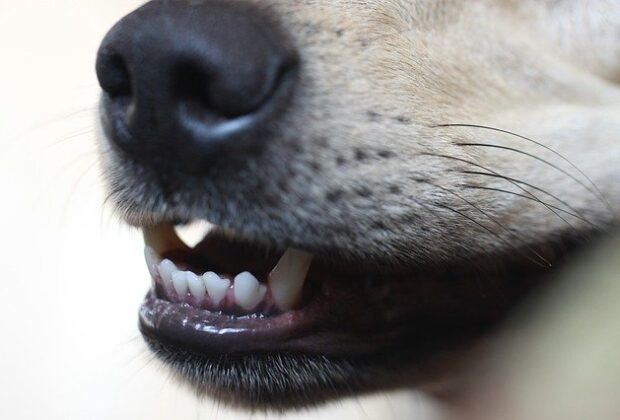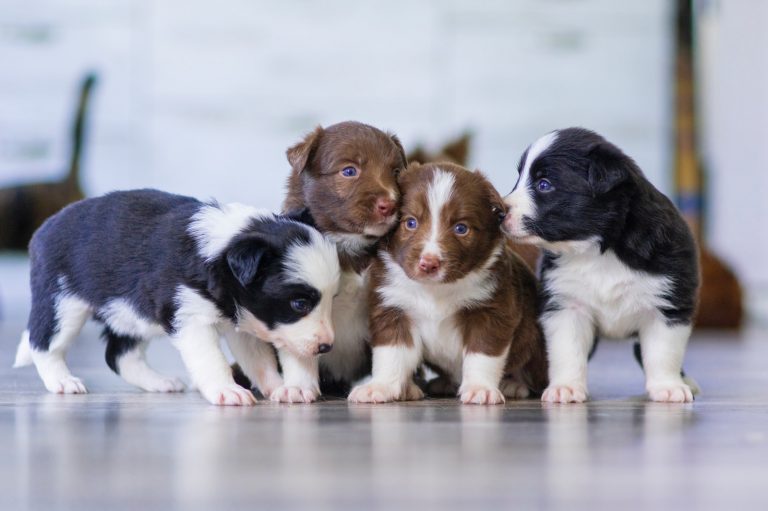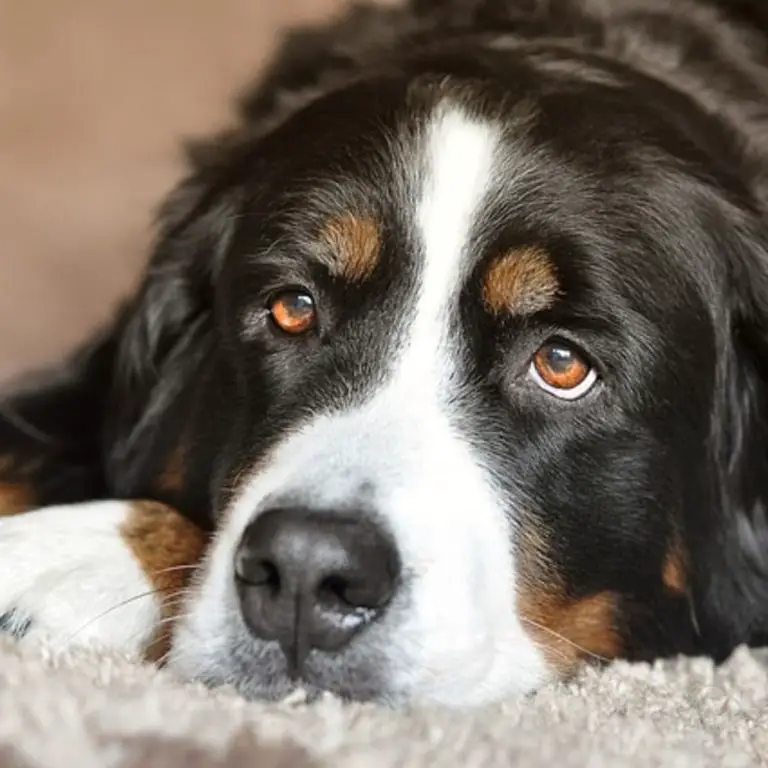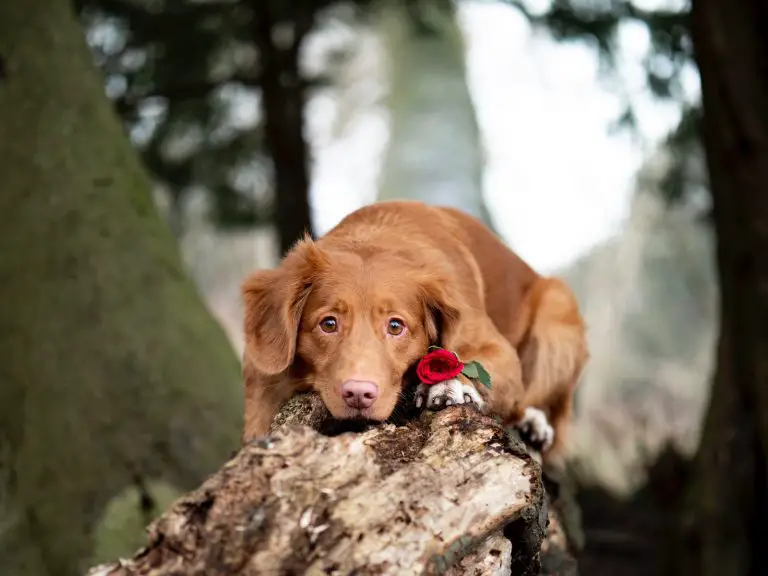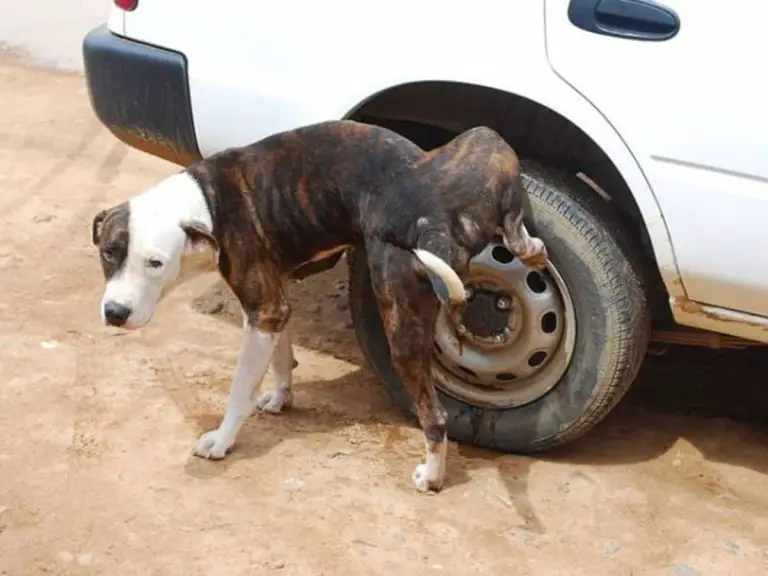Have you ever wondered why do dogs chatter their teeth after licking?
Did you notice your dog chattering his teeth after sniffing a spot? Or after licking something? Or is there some random teeth chattering going on with your dog? Well, this strange dog behavior has many wondering about it.
There are multiple reasons why your dog might be chattering his teeth. Most of the time, it is their basic dog instinct of analyzing when they come across something exciting like a new spot or odor, etc. And in some cases, it might be because they are stressed or ill.
As a dog mom or dog dad, this may or may not be something that you need to worry about. Don’t worry; we aim to help you understand this curious dog behavior. In this article, we look into the reasons behind why do dogs chatter their teeth after licking, including other various causes of teeth chattering episodes in dogs.
Let’s get started.
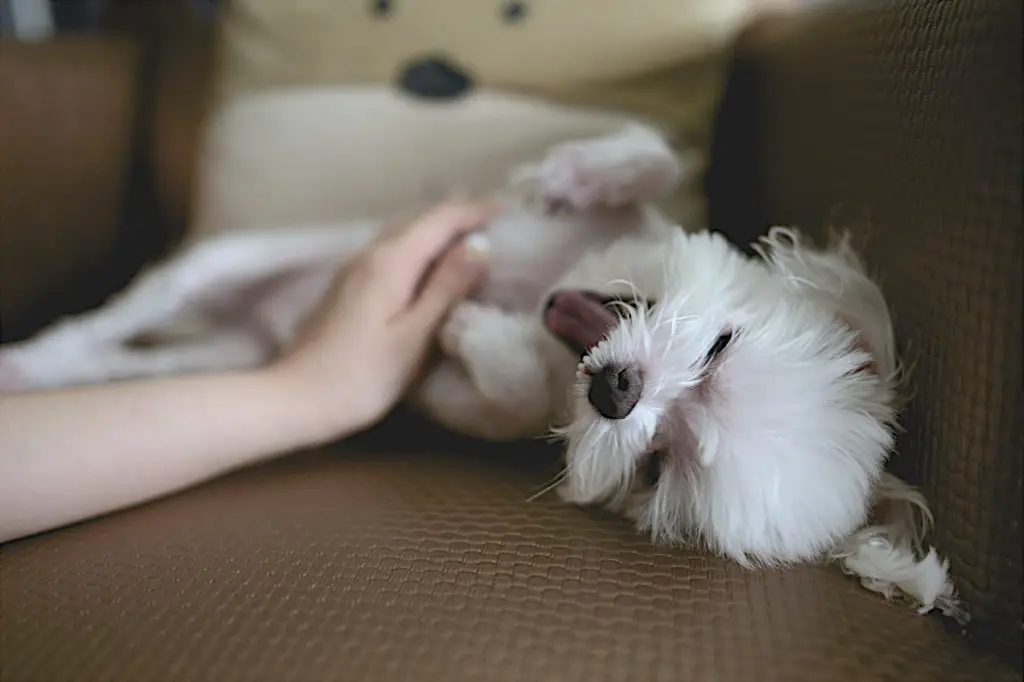
What Causes Dogs to Chatter Their Teeth After Licking?
Teeth chattering is exhibited in dogs when there is continuous clicking of teeth. It can signify several different things, such as a protective behavior, simple mood swings, or even severe periodontal or neurological deformities.
Thus, it is critical to pay attention to your Fido to correctly determine the cause of teeth chattering. Explained herein are the potential reasons why your dog is chattering his teeth.
Behavioral Chattering
One of the reasons why a dog may chatter his teeth is due to several behavioral factors. You can say it as – “a reaction to feeling or experiencing something.” This may include the following.
A. Reaction to Tasting Something Delicious
While smell matters more to dogs than the way their food tastes, they do have one-sixth the number of taste buds than humans do. Thus, they can determine what tastes delicious. And when they do, they tend to chatter their teeth. So, if you find your dog chattering his teeth while eating, there is a possibility that your dog finds the food delicious.
B. Response to Pleasant Aroma or Odor
Dogs are blessed with about 300 million scent receptors. On the contrary, we humans have only 5 million of them! According to a new scientific finding, a pleasant aroma or odor may activate the pleasure centers in your dog’s brain. This powerful sense of smell makes them remember a lot better than through any other means.
So, as a reaction to their favorite smell, like the aroma of their favorite food, the scent of their human companion, or scent of another dog (probably opposite sex), the dogs may start chattering their teeth. This may get them overly excited as well.
C. Create Distraction or Trying to Get Attention
Attention seeking behavior in dogs can be extraordinary. If they want something from their human companions, they will perform strange bodily contortions such as start chattering their teeth.
If you think that your dog is chattering his teeth to get attention, you can resolve this behavioral issue. Stop paying attention to your dog (but at first, you must look into it to determine whether your dog is doing it just for the fun of it, or is there any problem – consult a vet).
Moreover, they use teeth chattering as a form of communication as well, especially when they are on the verge of any harm or danger. This sort of communication is referred to as displacement language. In such a situation, the other dog or threat might pull away due to the noise of teeth chattering. This is their way of staying away from danger or harm.
D. Urge to Mate
Dogs possess an organ called the vomeronasal organ, which is shaped like a small pouch and situated between their nasal and vomer bones on top of their mouth. The primary function of this organ is to transmit chemical signals known as pheromones. The pheromones are also known as the sexual scent of attraction.
In dogs, the relationship between mating and pheromones is straightforward. Female dogs release pheromones through urine in the environment, sending a chemical message to male dogs to eject their sex cells. This leads to a strong urge to mate. Your dog chattering his teeth is an indication that he has caught the scent of a potential female.
Emotional Chattering
Dogs do have feelings. Just like humans, they can experience different emotions. So, when they are emotionally overwhelmed, they may start chattering their teeth. This kind of chattering is often harmless; nevertheless, you should be mindful of them. Following are some emotional reasons why dogs chatter their teeth.
A. Excitement
Excitement could lead dogs to chatter their teeth. The excitement can be due to anything, such as meeting the human companion after long hours, excitement on smelling great treats, excitement on meeting a partner, or excitement of performing an activity. They chatter their teeth because they can’t contain their excitement.
B. Joy
Dogs often chatter their teeth when they are in a joyous mood. So, if your dog began to chatter his teeth as soon as you take him to the park, then he is just happy to go out meet his friends. Sometimes, during the playtimes, they get overjoyed and start to chatter their teeth. This is just an impulse behavior, and there is nothing to worry about it.
C. Distress
Distress is one of the common causes of teeth chattering in dogs. It can happen due to a stressful home environment, separation anxiety, fireworks, thunderstorms, and other loud noises. Moreover, your dog may feel distressed due to the inclusion of another dog or pet in the family. They do this to show their frustration.
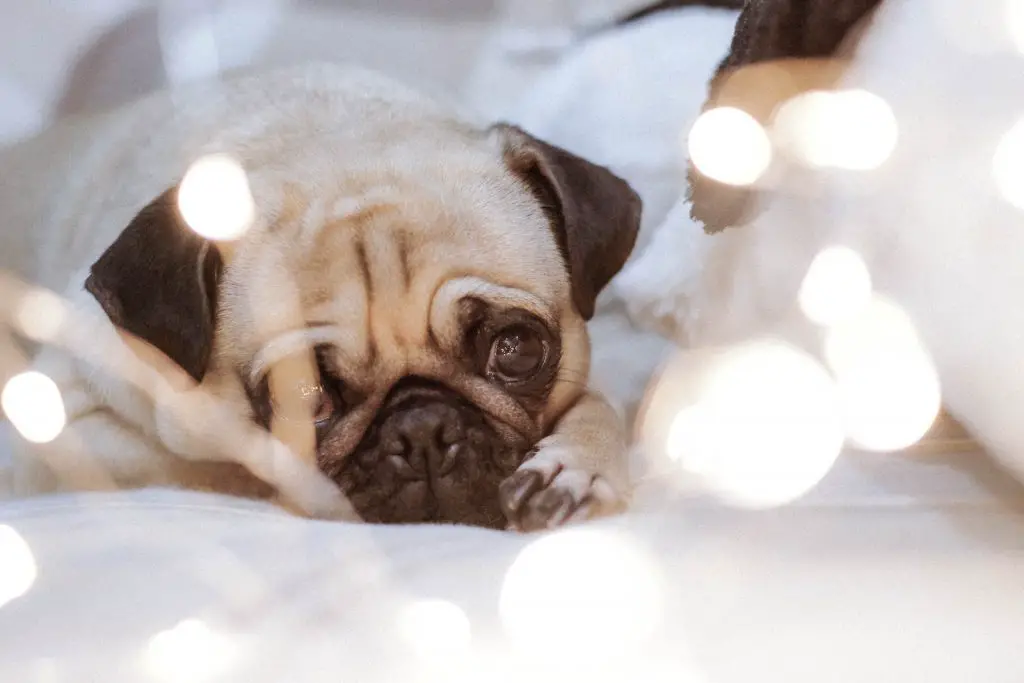
D. Fear (of another dog)
Most often, when a dog is surrounded by a group of other dogs or a large dog, they chatter their teeth out of fear, communicating that they don’t want any trouble. This behavior can be often seen when you take your dog to a park or a kennel where there are other unknown dogs.
E. Arousal
Arousal in dogs is how responsive your dog is to events occurring from the environment and you. Negative and positive triggers of arousal may include seeing a dog they are worried by, agility run, seeing a potential mating companion, and more. During such instances, dogs may start chattering their teeth.
F. Upset or Unhappy
Is your dog secretly mad at you? Dogs get upset, just like people. But they don’t send passive-aggressive messages to express their anger. Instead, they show that they are angry or unhappy with their actions.
Teeth chattering expresses so many emotions, but it mostly conveys that your Fido is extremely upset or unhappy about something. If your dog chatters his teeth while you are doing something to him, it could mean that he is mad about it.
Periodontal Disease
Periodontal disease in dogs can cause teeth chattering. The condition may cause significant pain. It mostly occurs in older dogs, but younger dogs may also experience the symptoms. It is a gum disease, which results in bacterial growth between the teeth and gums. When it is not treated in time, it might affect the teeth, tissue, and bones of your dog, and it can be harrowing for them.
However, often, dogs tend to mask their pain to appear healthy in front of their owners, but they occasionally chatter their teeth when the pain surfaces. Therefore, you must consider regular dental examinations as a necessary part of their grooming process. If they have inflamed gums, it might be an indication of disease.
Neurological Disorder
Neurological disorders in dogs affect the three main areas – the brain, nerves, and the spinal cord. Teeth chattering can be a sign of a neurological condition. Some of the neurological disorders that stimulate this behavior include:
A. Focal Motor Seizures
Focal motor seizure only affects the jaw of the dogs. It occurs for a short period, which you can miss if you are not paying attention. It causes the jaws to tighten, resulting in a short span of chattering. While it is generally not anything serious, it is a good idea to get your pup checked to ensure whether or not it is symptoms of something serious.
B. Epilepsy
Epilepsy is a common neurological condition among dogs, and it can be a result of multiple things that include allergies or tumors. In this condition, the entire body of your dog tends to shake. The chattering of teeth is a reaction to these types of seizures. Intense foaming and drooling are also accompanied during it. If something like this occurs, make sure you immediately take your dog to the vet and get it checked.
C. Shaker Syndrome
Shaker syndrome is also referred to as Multi system Neuronal Degeneration that causes the entire body to tremble, during which your dog may chatter his teeth. It also causes your dog to lose its balance. Primarily, it is a hereditary issue that affects breeds, including Maltese, Bichon Frise, and Cocker Spaniel.
Physical Injury
During a physical injury, dogs may experience a lot of pain and suffer from anxiety. This emotional and physical distress may cause them to chatter their teeth. It primarily occurs when they have injured their lower jaw resulting in it becoming weak. So, if you see your dog chattering teeth after sustaining a physical injury, it is a sign that he is in distress.
Cold Weather
When faced with frigid temperatures, your dog’s teeth may chatter. Just like humans, when there is a significant drop in temperature, our body starts to shiver. The same is the case with dogs.
When dogs feel cold, they often chatter their teeth. This is especially common in dogs with short hairs. When you see your dog shivering from freezing, make sure to keep them warm.
Old Age
The chattering of teeth is often witnessed in older dogs. If they don’t show any symptoms that suggest otherwise, it might be just because of old age. This behavior can affect any dog breed after it has reached a particular age.
You must pay close attention to their behavior and understand what is stimulating it. You can also consult the vet to recognize your dog’s health situation better and get the necessary treatment promptly.
Here is a video on multiple reasons why dogs chatter their teeth including chattering after licking or tasting.
Do Dogs Chatter Their Teeth After Licking Something Bitter?
Dogs can taste things that are sour, sweet, salty, and bitter. So, after licking and a couple of bites later, the taste or texture of the object might cause them to chatter their teeth. Thus, if your dog tastes something gross, whether it is food or any other thing, it is likely to chatter its teeth as an impulse.
Do Dogs Chatter Teeth After Licking Due to an Allergy?
Allergies can stimulate teeth chattering in dogs. If your dog has a specific allergy to any food(s), scents, weather, etc., it can cause distress in them, leading to teeth chattering. There have been cases of dogs that are allergic to grains and chattered a lot. Along with teeth chatters, there might be a formation of excessive drool or foam around the mouth due to an allergic reaction.
You should not ignore such a condition and immediately consult the veterinarian to treat the allergy and figure out whether or not it is a symptom of something more serious. We recommend that you order an allergy test for your dog if the root cause of teeth chattering is still unknown.

What to Do If a Dog Is Chattering Teeth Due to Periodontal Disease?
As mentioned earlier, periodontal disease is one of the reasons why your dog is teeth chattering. It is a situation when food and bacteria get accumulated between the teeth and gums, resulting in the formation of plaque.
You must take your pup to the veterinarian to get proper treatment. The vet will thoroughly examine the teeth and look for infection or inflammation that might weaken the support structure of your dog’s teeth. If you don’t treat this situation in time, it might lead to many other health complications.
If your dog is in the early stages of this disease, a through cleave of gum can remove the plaque through an ultrasonic scare. The vet will further fill the crevices between teeth to prevent any plaque build-up.
For stages 3 and 4 of periodontal disease, more frequent cleaning is required, and it might even need surgery to treat the damage. Your dog might also be provided with pain medication and put on a soft food diet for a couple of weeks post the surgery.
The best way to prevent periodontal disease altogether in your dog is through maintaining a proper diet, maintaining proper oral hygiene, and being responsible about what you allow your dog to chew.
What to Do If Your Dog Is Chattering Teeth Due to a Neurological Disorder?
A neurological disorder sometimes causes teeth chattering in a dog. It is a serious issue that might be an indication of a critical health problem. So, if your dog is chattering its teeth without any relevance to the common causes and more frequently, you should get an immediate appointment with a veterinarian.
The vet will ask you questions like when did the signs begin, if there is any injury, whether the dog is eating something new or taking any medications, etc. After that, the dog will be accepted for a physical and neurological examination where different nerve functions and reflexes will be tested.
After taking all the tests, the vet will tell you the kind of neurological disorder your dog is dealing with that might include seizures, spinal diseases, Wobbler syndrome, inter vertebral disc degeneration, and herniation. You must take your dog to the vet immediately and get the essential treatment to ensure there aren’t any further health issues and complications.
How to Train a Dog to Stop Chattering Teeth After Licking?
If your dog is chattering teeth due to health conditions like neurological disorders, periodontal disease, or allergy, then your dog requires immediate medical care and treatment. As discussed earlier, teeth chattering is mostly caused due to distress. These conditions can cause distress in your dog.
On the other hand, if your dog is teeth-chattering for no reason, you can start training your dog by putting a muzzle around his face. Every time your dog does something like this, you can put a muzzle over his face. This will trigger your dog’s brain that doing this is a bad idea.
Moreover, your dog needs a lot of exercise so that all his excitement remains content. Last but not least, if your dog has reached the mating age, ensure he finds the right mate. This will keep your dog from getting overexcited.
Conclusion
Now that you know all the possible reasons why dog dogs chatter their teeth after licking, it is time to act accordingly. To ensure that your pup stays healthy, you must be aware of each of these reasons. Some of the reasons that cause teeth chattering are normal, like cold, happiness, anxiety, and other environmental factors.
However, sometimes, teeth chattering in your dog is directly related to severe health issues that should be addressed immediately. And being aware of the causes helps you to be proactive about the health of your canine friend. You can get timely treatment for your dog and ensure that it stays healthy and active.
Daniel Bloom is the mind behind the Dog Pages blog. He created this blog for the love his dog, Augustine. He manages his team of contributors who love dogs as much as he does. When he is not blogging, he spends his time cooking and reading. He never misses his daily walks with his dog and loves to play Frisbee with Augustine whenever he gets a chance.
Did you like this article?

